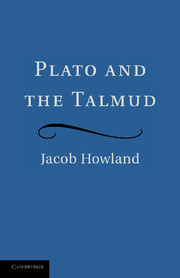Book contents
- Frontmatter
- Contents
- Acknowledgments
- Introduction: Athens and Jerusalem
- 1 Talmudic and Platonic Writing
- 2 Rabbis and Holy Men
- 3 Prophets and Philosophers
- 4 Fathers and Sons
- 5 Words and Deeds
- 6 Gods and Men
- 7 Miracles and Necessity
- Epilogue: Texts and Traditions
- Works Cited
- Index to Biblical and Rabbinic Texts
- General Index
5 - Words and Deeds
Published online by Cambridge University Press: 10 November 2010
- Frontmatter
- Contents
- Acknowledgments
- Introduction: Athens and Jerusalem
- 1 Talmudic and Platonic Writing
- 2 Rabbis and Holy Men
- 3 Prophets and Philosophers
- 4 Fathers and Sons
- 5 Words and Deeds
- 6 Gods and Men
- 7 Miracles and Necessity
- Epilogue: Texts and Traditions
- Works Cited
- Index to Biblical and Rabbinic Texts
- General Index
Summary
The accomplishment of Socrates in the Platonic dialogues is considerably less flamboyant than that of Ḥoni HaMe'aggel, but what he lacks in flash he makes up in depth. This seems to be the lot of all true teachers. Socrates is comparable to Ḥoni because he claims to do the greatest good for the Athenians, and to be a gift of the god to his city. But unlike Ḥoni's dramatic rainmaking, Socrates' deeds are generally not regarded as beneficial, and they are certainly not miraculous. Insofar as he does benefit the Athenians, it is by making them think about their lives and providing them with an example that is worthy of imitation. Ḥoni, on the other hand, is not a teacher, and the Talmud does not present him as someone who can, or should, be imitated.
While the Talmud works hard – somewhat too hard, in fact – to explain the merit it assumes Ḥoni must have possessed in order to win the favor of God, it concludes by drawing from his story a negative lesson about the overriding value of intellectual companionship. In doing so, the Talmud calls attention to the difference between Ḥoni's accomplishment as a miracle worker and that of the rabbis of the academy – including, at least implicitly, the accomplishment of the Talmud itself. The Talmud cannot bring rain, which, with the addition of physical labor, human beings can turn into food that will sustain their bodies.
- Type
- Chapter
- Information
- Plato and the Talmud , pp. 164 - 187Publisher: Cambridge University PressPrint publication year: 2010



